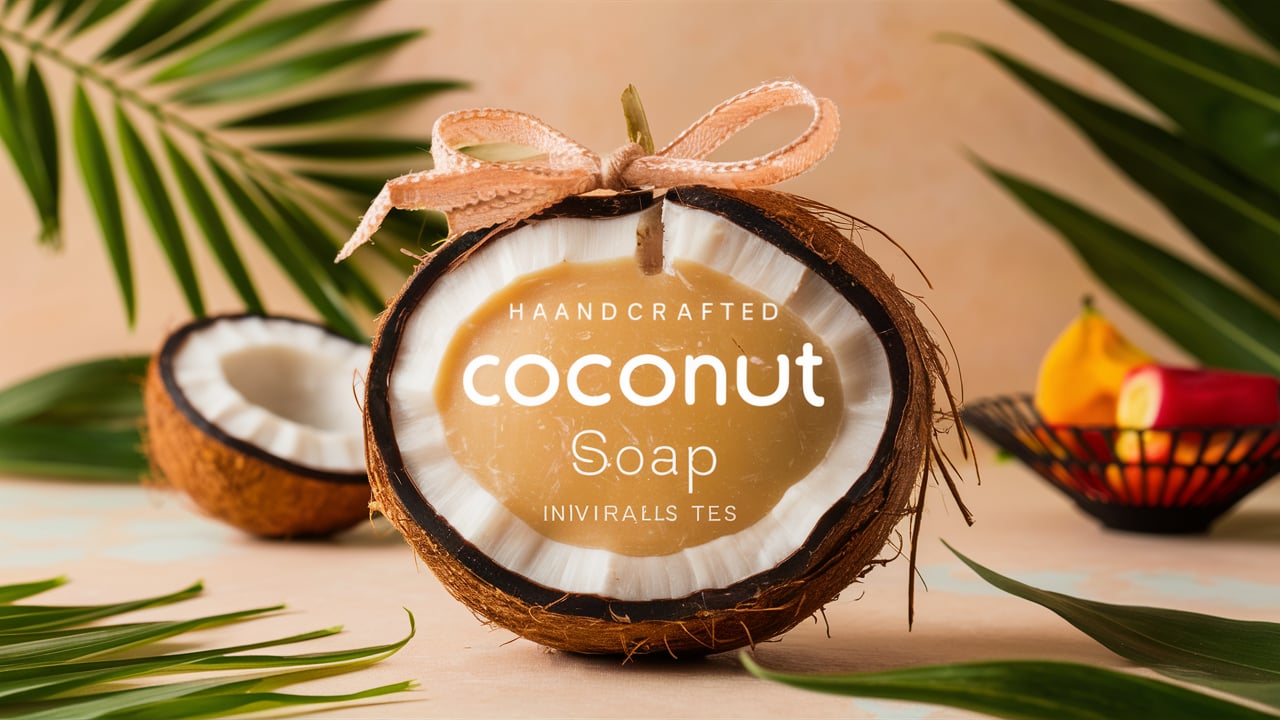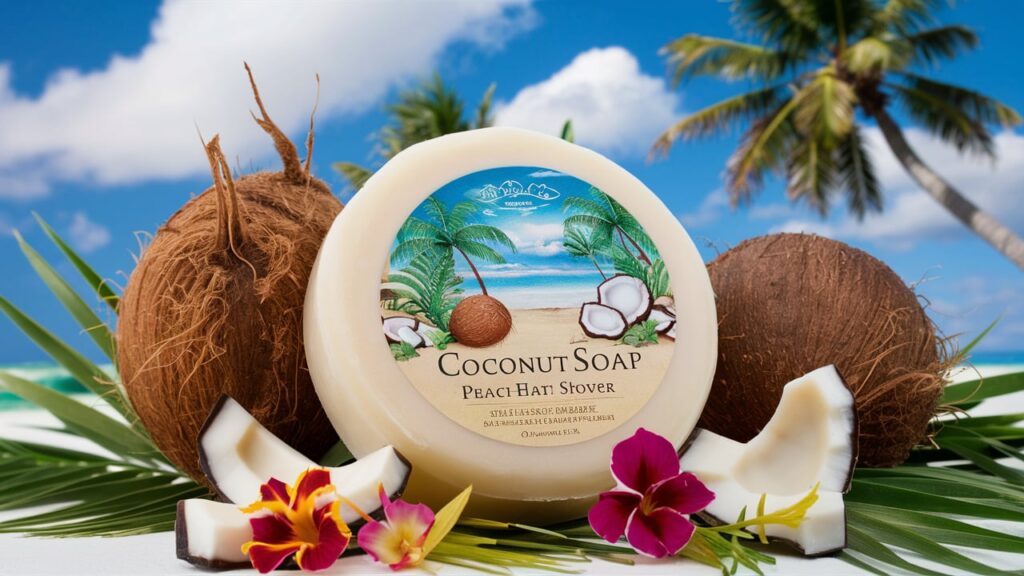In the world of skincare, natural ingredients have taken the spotlight for their numerous benefits and minimal side effects.
Among these ingredients, coconut oil stands out as a versatile and effective component.
Coconut oil soap, in particular, has gained immense popularity for its myriad of skin-loving properties.
But what makes coconut oil soap it so special?
Let’s dive into the wonderful benefits of coconut oil soap and discover why it should be a staple in your skincare routine.
Introduction to coconut oil soap: What it is and why it’s gaining attention
Coconut oil soap is a popular choice for its cleansing power and natural ingredients.
Pure coconut soap is made through a process called cold process soap making.
The method involves a chemical reaction between the oil and a lye solution (usually sodium hydroxide).
DIY Coconut oil soap is simpler to make, with fewer additives and fragrances compared to some commercial soaps.
Soap Secrets: Why Homemade Soaps Are Your Skin’s New Best Friend
Coconut soap Skin Health Benefits
Here are some of the main coconut oil in soap benefits:
Hydration and Miniaturization
100 percent coconut oil soap excels at cleansing, thanks to its high content of lauric acid.
The fatty acid helps create a bit of a lather and can actually help improve the skin’s natural moisture barrier.
This barrier helps prevent excessive water loss from the skin, keeping it hydrated.
Coconut oil is also rich in medium-chain fatty acids that can be absorbed by the skin.
These fatty acids might help replenish the skin’s natural oils, potentially leading to a smooth feel.
Antibacterial and Antifungal Properties
Coconut oil for soap contains lauric acid, a medium-chain fatty acid that makes up a significant portion (around 50%) of coconut oil.
Lauric acid has been shown to be effective against certain bacteria and fungi.
The acid can disrupt the cell membranes of some bacteria and fungi.
This disrupts their structure and function, potentially killing them.
While lauric acid shows promise, coconut oil soap isn’t guaranteed to kill all bacteria or fungi.
More research is needed to fully understand its effectiveness against specific strains.

Nutritional Benefits for the Skin
Coconut oil soap itself doesn’t directly provide nutrients to the skin in the same way food nourishes the body.
However, the properties of coconut oil within the soap can benefit the skin in a few ways:
- Just like milk soap, coconut oil is rich in medium-chain fatty acids that are absorbed by the skin. These fatty acids might help replenish the skin’s natural oils.
- Coconut oil soap excels at cleansing due to its lauric acid content. The fatty acid helps create a lather and can improve the skin’s natural moisture barrier.
- This barrier helps prevent excessive water loss from the skin, keeping it hydrated. The moisturizing benefit depends on skin type.
Cold-process coconut oil soap tends to retain more of the beneficial fatty acids compared to some commercially produced varieties.
User Testimonials and Experiences
According to the video review, organic coconut oil is beneficial in skin care as it connects people and helps with various infections.
The oil is recommended for use as a moisturizer due to its natural properties.
It:
- Restores and improves skin dramatically.
- Helps reduce the risk of infections and promotes healthy skin.
- Coconut oil has antimicrobial properties that are beneficial for the skin.
- Be used as a conditioner for the skin.
- Refines and improves skin texture.
How to Choose the Right Coconut Oil Soap
Here’s a guide to choosing the right coconut oil soap for your needs:
Consider Your Skin Type:
Dry Skin: Opt for a coconut oil soap blended with other nourishing oils like olive oil, shea butter, or cocoa butter. These add a moisturizing element.
Oily Skin: Pure coconut oil soap can be a good choice for its cleansing power. Look for cold-process varieties that tend to retain more beneficial fatty acids.
Sensitive Skin: Patch test any new soap on a small area of your skin before using it all over. Choose a soap with minimal ingredients and avoid harsh fragrances or dyes.
Look at the Ingredients:
Pure vs. Blended: “Castile soap” indicates pure coconut oil soap, which can be more drying. Blended soaps with other oils offer more versatility.
Cold-Process vs. Commercially Produced: Cold-process soap tends to retain more lauric acid (good for lather and potentially antibacterial properties) and fatty acids (potentially moisturizing).
Beware of Additives:
Fragrances, dyes, and other additives can irritate some skin types. Choose a soap with minimal ingredients if you have sensitive skin.
Think About Your Preferences:
Lather: Coconut oil soap is known for its rich lather. If you prefer a more gentle lather, look for a soap blended with other oils.
Scent: Pure coconut oil soap has a mild coconut scent. Scented varieties are available, but choose ones with natural fragrances if you have sensitive skin.
Manufacturing Process: If you value sustainability, look for brands that use organic, ethically sourced ingredients and have eco-friendly practices.
Potential drawbacks of coconut oil soap
Coconut oil soap, while having many benefits, does come with some potential drawbacks.
Main Culprit: Coconut oil soaps excels at cleansing and removing dead skin cells due to its high lauric acid content.
It is especially beneficial for oily skin, but for dry or sensitive skin, it might be too stripping.
The cleansing action removes some of the skin’s natural oils, leading to dryness and irritation.
Comedogenic Properties:
Clogged Pores: Coconut oil is rated as comedogenic, meaning it can clog pores. This is especially problematic if you have acne-prone or oily skin. The fatty acids in coconut oil can form a barrier on the skin’s surface, trapping dirt, oil, and bacteria, potentially leading to breakouts.
Not a Magic Antibacterial Solution:
While lauric acid in coconut oil soap might have antibacterial properties, it’s not a guaranteed germ-killer.
More research is needed to understand its effectiveness against specific strains of bacteria.
Concentration Matters:
The amount of lauric acid remaining after the soap-making process can vary. Cold-process varieties tend to have more, but the overall benefit might be limited.
Remember:
Individual Needs: Everyone’s skin is different. What works wonders for one person might not be ideal for you. Experiment and see how your skin reacts.
Consult a Dermatologist: If you have any concerns about your skin or need a soap for a specific condition, consult a dermatologist for personalized advice.
Frequently Asked Questions
What are the benefits of using coconut oil soap?
The main benefits of coconut oil in soap include moisturizing, antibacterial anti-inflammatory, cleansing and anti-aging.
Is coconut oil soap suitable for all skin types?
Yes, coconut oil soap is generally suitable for all skin types. However, people with extremely sensitive skin or allergies to coconut oil should patch test before regular use.
Can coconut oil soap help with acne?
Coconut oil soap can help with acne due to its antibacterial properties, which help reduce the bacteria that cause acne. Monitor your skin’s reaction as coconut oil is comedogenic for some people, potentially clogging pores.
How should coconut oil soap be stored?
To extend the life of your coconut oil homemade soap, store it in a cool, dry place away from direct sunlight. Use a soap dish with good drainage to prevent the soap from sitting in water, which can cause it to dissolve more quickly.
If the soap becomes too soft, allow it to dry out completely before the next use.
Are you ready to transform your skincare routine with the natural goodness of coconut oil soap? Say goodbye to dry, irritated skin and hello to a soft, nourished, and radiant complexion.

I’m a devoted organic skincare enthusiast, passionate about the natural, wholesome goodness that organic products bring to our skin.
Organic skincare isn’t just a hobby for me—it’s a lifestyle. Every product I use, recommend, and write about has been carefully chosen for its purity and effectiveness. Everything I write about is backed by scientific studies, dermatologists’ opinions, and user experiences.
I also excel at tackling skincare challenges with innovative, organic solutions.


